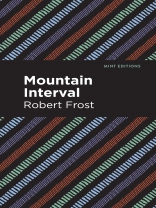Mountain Interval (1916) is a collection of poems by American poet Robert Frost. Having gained success with his first two collections, both published in London, Frost returned home to New Hampshire and completed his third volume, Mountain Interval. The book opens with “The Road Not Taken, ” and though this would become Frost’s most famous poem, the collection is not defined by it. Here we find the hallmarks of Frost’s work: rural landscapes, dramatic monologues, and subtle meditations on the meanings of life and art. This is Frost at the height of his power, a poetry that speaks as much and as often as it listens.
“The Road Not Taken” is a meditation on fate and free will that follows a traveler in an autumn landscape, unsure of which path to take, but certain he cannot stand still. Often summarized using only its final two lines—“I took the one less traveled by, / And that has made all the difference”—Frost’s poem refuses such neat categorization. Far from simple praise of independence, “The Road Not Taken” examines the anxiety of choice, the psychic response to the uncertainty that precedes even the simplest decision. In “Birches, ” Frost recalls his childhood fondness for climbing trees, raising himself from the ground “To the top branches, ” only to fling himself “outward, feet first” back to earth. Against the backdrop of adulthood, in which “life is too much like a pathless wood, ” the poet recalls the simplicity and wonder of being a child in nature, no more and no less than “a swinger of birches.”.
This edition of Robert Frost’s Mountain Interval is a classic of American literature reimagined for modern readers.
Since our inception in 2020, Mint Editions has kept sustainability and innovation at the forefront of our mission. Each and every Mint Edition title gets a fresh, professionally typeset manuscript and a dazzling new cover, all while maintaining the integrity of the original book.
With thousands of titles in our collection, we aim to spotlight diverse public domain works to help them find modern audiences. Mint Editions celebrates a breadth of literary works, curated from both canonical and overlooked classics from writers around the globe.
A propos de l’auteur
Robert Frost (1874-1963) was an American poet. Born in San Francisco, Frost moved with his family to Lawrence, Massachusetts following the death of his father, a teacher and editor. There, he attended Lawrence High School and went on to study for a brief time at Dartmouth College before returning home to work as a teacher, factory worker, and newspaper delivery person. Certain of his calling as a poet, Frost sold his first poem in 1894, embarking on a career that would earn him acclaim and honor unlike any American poet before or since. Before his paternal grandfather’s death, he purchased a farm in Derry, New Hampshire for Robert and his wife Elinor. For the next decade, Frost worked on the farm while writing poetry in the mornings before returning to teaching once more. In 1912, having moved to England, Frost published A Boy’s Will, his first book of poems. Through the next several years, he wrote and published poetry while befriending such writers as Edward Thomas and Ezra Pound. In 1915, after publishing North of Boston (1914) in London, Frost returned to the United States to settle on another farm in Franconia, New Hampshire, where he continued writing and teaching and began lecturing. Over the next several decades, Frost published numerous collections of poems, including New Hampshire: A Poem with Notes and Grace Notes (1924) and Collected Poems (1931), winning a total of four Pulitzer Prizes and establishing his reputation as the foremost American poet of his generation.












